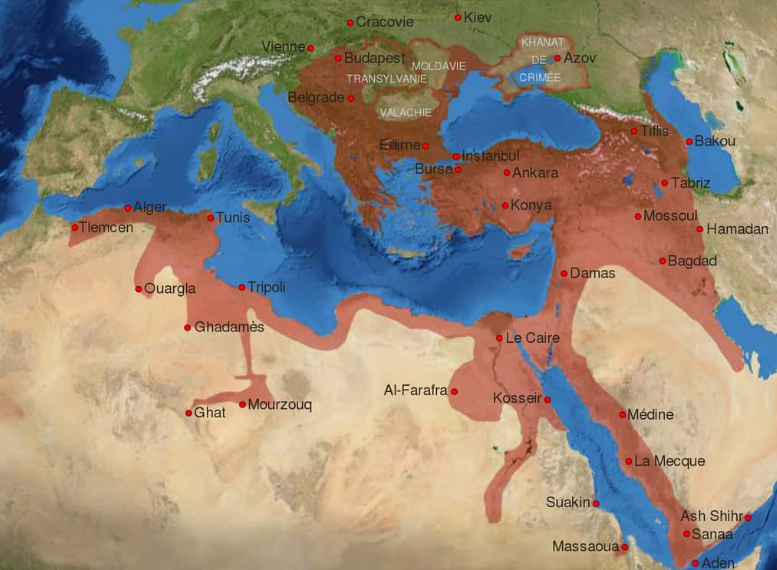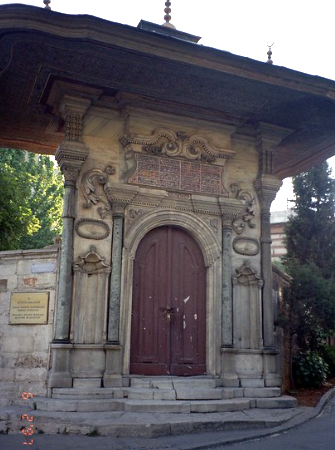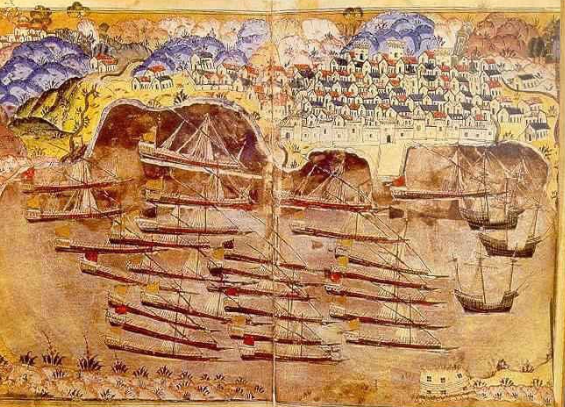The beginning of a long alliance between France and the Middle East
François 1er and Soliman conclude in the 16th century a historic agreement, one of the first across the Mediterranean between a Christian king and a Muslim sovereign. This agreement, if it was mainly motivated for political reasons, was the starting point of privileged relations between France and the Middle East, throughout its history.

The origins of the agreement
Sultan Suleiman the Magnificent symbolized at that time the power and influence of the Ottoman Empire which dominated the Mediterranean from the coasts of North Africa to the shores of the Black Sea.
In 1522, Soliman took the island of Rhodes from the Knights of Saint John of Jerusalem and thus increased his domination.
François 1er has been on the throne of France since 1515. His main opponent is Charles V, Emperor of the Holy Germanic Empire, who seeks to extend his kingdom in the Balkans and the Mediterranean. It is also to protect himself from the imperial army that François 1er built the Château d’If in the harbor of Marseille. In 1525, François 1er suffered a major defeat against his rival at the Battle of Pavia: weakened and a supporter of a certain « realpolitik », he then turned to the Ottoman power to counter his adversary.

The sublime gate in Istanbul
The two sovereigns conclude an agreement, which marks a reversal in the previous system of alliances, marked by a logic of opposition. In 1536, a second agreement was concluded between the two powers, called « capitulations ». The embassy sent by the King of France Jean de la Forest passes through Constantinople under the door called by the Ottomans « the high door » or « noble », which becomes in French diplomatic language the « Sublime Porte ».
This treaty offers France a right of permanent representation with embassy and consulate, as well as commercial advantages, in particular guarantees concerning the security of goods and people and a quasi-monopoly on trade with the East. Foreign vessels are authorized to trade with Turkey but under the French banner and after payment of taxes. The “Capitulations” were renewed in 1604 and maintained until the birth of the Republic of Turkey in 1923.
The protection of Eastern Christians
This first alliance between a Christian sovereign and a Muslim sovereign is described as impious in the West and shocks a good part of Christians. To better legitimize these agreements, François 1st obtained from the sultan the right to protect Christians in the Holy Land: the French could freely practice their religion in the Ottoman Empire and were entrusted with the custody of the holy places. As they were renewed, the protectorate of France was extended to all the Christians of the Empire linked to Rome.
This law will constitute the instrument of French influence in the Middle East. These capitulations will have an impact on several historical events such as the « quarrel of the monks » over the custody of holy places, the beginnings of the Crimean War.

On a double page of the Süleymanname from the Topkapı Museum – Ottoman fleet wintering in the port of Toulon in 1543.
An alliance that brings encounters
In line with this agreement, Marseilles will welcome in 1543¸ with honors, the corsair Barbarossa allied to the Ottoman sultan. The city of Toulon was made available for several months to Muslim corsairs from Algiers and the Sainte Marie Majeure cathedral was even transformed into a mosque. An observer reports: « To imagine Toulon, one must imagine oneself in Constantinople, each doing his job and making Turkish merchandise with great police and justice ». In 1548, a French embassy stayed in the Middle East, notably in Aleppo, with the participation of scholars and the first orientalists, in a political and humanist spirit. This embassy then continued on its way to the Holy Land where it was received with great pomp.
The French presence in Jerusalem for a long time under Ottoman domination is the heir to these privileged relations. This is evidenced by the role of the French consul in Jerusalem, who must in particular ensure the protection of religious communities, in particular 40 congregations and 300 religious. The French Consul is the only diplomat in Jerusalem who inaugurates his duties with a solemn entry into the Holy Sepulchre, in uniform, preceded by two kawas, guards in livery of janissaries carrying saber and ceremonial baton. He was welcomed there by a French Franciscan father. A Te Deum then resounded in the Basilica of Saint Anne, one of the French domains in Jerusalem.
One place in Istanbul embodies this special relationship, that of the Palais de France, which houses the residence of the French consulate. Acquired at the end of the 16th century, it is one of France’s oldest diplomatic sites abroad. In particular, it will house the school for young people of languages created by Colbert to train future interpreters in the languages of the Levant. The Church of Saint Louis of the French was erected there after the authorization of the Sultan in 1673. Prestigious French-speaking high schools such as the Galataseray high school, which brought together students of different faiths, also testify to these centuries-old cultural links.
CD.
